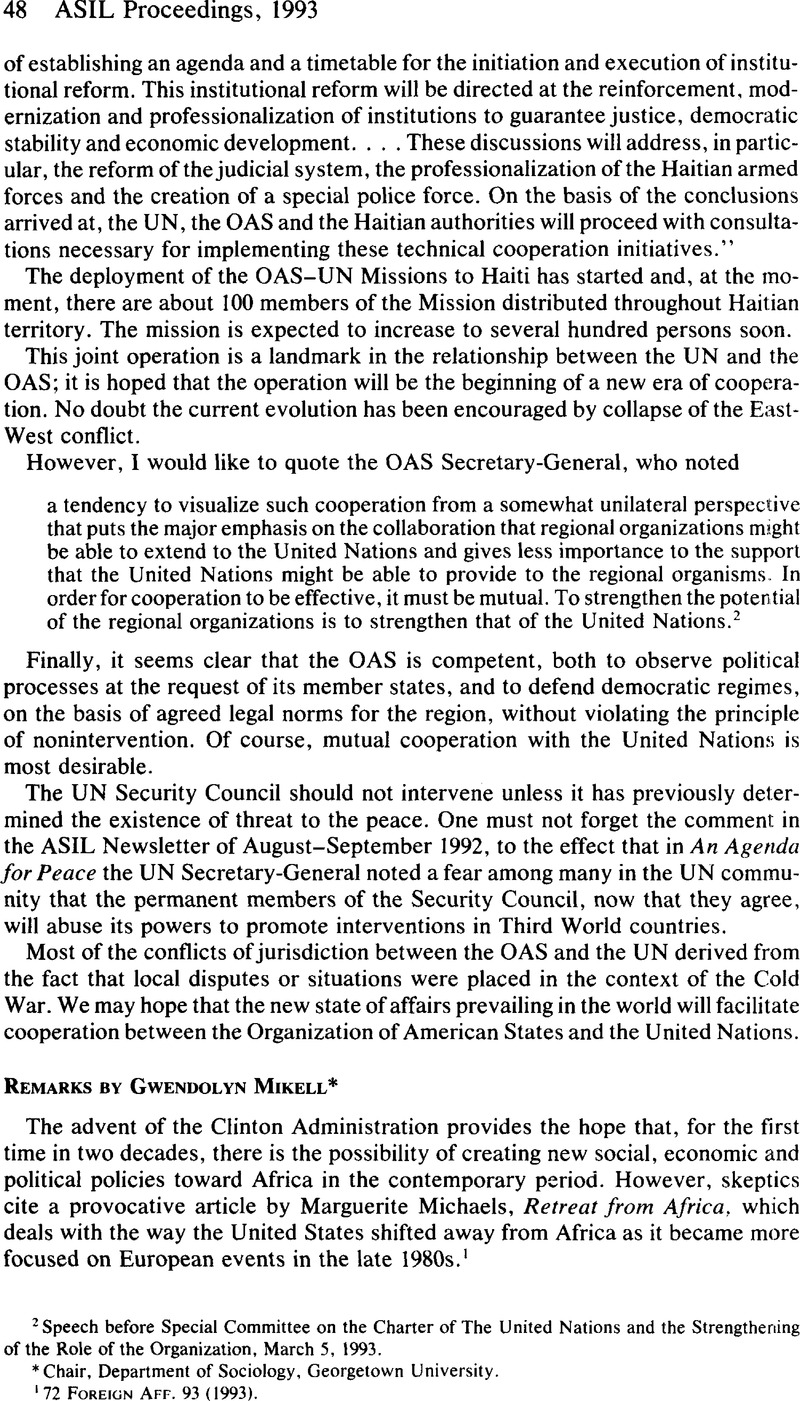No CrossRef data available.
Article contents
Remarks by Gwendolyn Mikell
Published online by Cambridge University Press: 28 February 2017
Abstract

- Type
- Effects of the New World Order on the Third World
- Information
- Copyright
- Copyright © American Society of International Law 1993
References
1 72 FOREIGN AFF. 93(1993).
2 In fact, in the days leading up to the swearing in of Congress, new senators and representatives received unprecedented pressures from blacks and other Africa well-wishers to take Foreign Relations and other Africa-related subcommittee assignments. Congresswoman Carol Moseley Braun was rumored to quip “Lay off it! I am not going to become Ms. Africa spokesperson in the Senate. Don’t misunderstand me … I am supportive … but publicly I’ve got to do the judiciary thing, not the Africa thing.”
3 See generally Lofchie, Michael (ED.), The State of the Nation: Constraints on Development in Independent Africa (1971)Google Scholar.
4 See generally Immanuel Wallerstein, The Modern World System (1974); Gutkind, Peter C. W. & Wallerstein, I. (EDS.), The Political Economy of Contemporary Africa (1976)Google Scholar; Rodney, Walter, How Europe Underdevelop Africa (1970)Google Scholar. For a more radical approach, see Amin, Samir, Accumulation on a World Scale: A Critique of the Theory of Development (1974)Google Scholar, and S. Amin, Self-Reliance and the New Economic Order, in Singham, Archie (ED.), The Non-Aligned Movement in World Politics 145 (1977)Google Scholar.
5 See Gwendolyn Mikell, Cocoa and Chaos in Ghana 215 (1989); See also Mikell, G., Peasant Politicization and Economic Recuperation in Ghana: Local and National Dilemmas, 27 J. MOD. AFR. STUD. 455 Google Scholar.
6 See Tabatabai, Hamid, Agricultural Decline and Access to Food in Ghana, 127 INT’L LAB. REV. 703 (1988)Google Scholar. See also Mikell, Gwendolyn, Culture, Law, and Social Change: Changing the Economic Status of Women, 17 YALE J. INT’L L. 255 (1992)Google Scholar.
7 The American or Asian routes to development have never been a realistic option for African countries. They went through a lengthy process of western colonial control that linked their economies to those of the West in a dependent fashion. Yet, upon independence, they did not have the potential for industrialization, nor western patrons willing to offer nonmilitary assistance so that they could build rational, growth-oriented economic and political structures. Thus, the African countries did not achieve the savings of 20 percent of GNP as did the Asian countries. Without economic diversification, and with agricultural exports accounting for 50–80 percent of GNP, they simply sank deeper into debt.
8 Ghana Country Profile 1992–1993, Economic Intelligence Unit, Economist, 1993, at 35.
9 See Kpor, C., The Cocoa Conundrum, W. AFR., Mar. 6–12, 1989, at 1141 Google Scholar. See also Abdulai, Awudu & Egger, Ursula, Intra-Regional Trade in West Africa, FOOD POL’Y, Aug. 1992, at 277 CrossRefGoogle Scholar.
10 See Browne, Robert S. & Cummings, Robert J., The Lagos Plan of Action versus The Berg Report: Contemporary Issues in African Economic Development, Howard University Monographs in African Studies 216 (1984)Google Scholar. See also International Institute for Labor Studies/Organization of African Unity, Lagos Plan of Action for Economic Development of Africa, 1980–2000 (1981).
11 See generally National Research Council, Democratization in Africa: African Views, African Voices (1992).
12 In fact, the Carter Center was the primary Western group working with the National Election Monitoring Group and the Ghana Council of Churches to recruit and train local observers in each area to assist with the elections. Other groups, from Switzerland, Japan and Canada, helped provide some computer equipment to clean up the electoral rolls, but the limited technical support meant that technology was a minor factor in the election process.
13 Some of their concerns are the Savimbi/uNlTA ongoing conflict in Angola, the persistence of Mobutu in Zaire, and the 1980s U.S. policy of “constructive engagement” with the South African white regime, widely perceived by them as having delayed the transition to majority rule in South Africa.
14 As one example, several of the historically black U.S. colleges and universities are creating economic development associations and training programs, developing African language institutes, and forming international affairs centers to study African policy concerns. Increasingly, the Congressional Black Caucus is heeding the concerns of these organizations.


